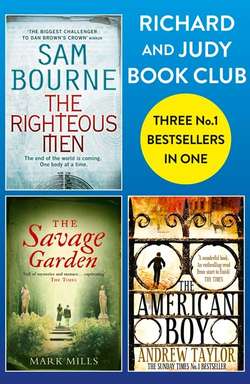Читать книгу Richard and Judy Bookclub - 3 Bestsellers in 1: The American Boy, The Savage Garden, The Righteous Men - Andrew Taylor, Andrew Taylor - Страница 50
Chapter 40
ОглавлениеThe Christmas Eves of my youth had left me with many happy memories. My father was a cool, grave, remote man who took no part in the festivities of the season. But my mother would take me to the house of an aunt. She had married a whitesmith and, though comfortable, the family was not in such prosperous circumstances as we believed our own to be. But on a single Christmas Eve in their house, there was more laughter than in ours the whole year round.
In my aunt’s kitchen, there was always a great sprig of mistletoe, and we boys had the privilege of kissing the girls beneath it; and for each kiss, a berry was plucked from the bush. This circumstance led to much frenzied arithmetic, for when all the berries had been plucked, the privilege ceased.
I spent my last Christmas Eve in Rosington at my aunt’s house. This was after my parents had died, when I was teaching at the grammar school. Fanny, the daughter of the school’s new master, had paid a visit. That day I kissed her for the first time, and it was underneath my aunt’s mistletoe bush. Usually the memory of her made me feel melancholy. Not this year, however – instead, the thought crossed my mind that if I had not kissed Fanny under the mistletoe five years before, I should not be at Monkshill-park today.
Not that Mr Carswall encouraged any sign that it was Christmas Eve in his house. Rustic festivities would have been out of place in this great stone block, this temple to modern taste. None of the chaste marble fireplaces was large enough to hold a Yule log, even if such a thing had been available.
That evening I was invited to dine again with the Carswalls, Mrs Lee and Mrs Frant. Mr Carswall brought the conversation round to the subject of church.
“I had a note from the Rector,” he said. “Sir George is bringing a party over from Clearland-court.”
Miss Carswall cast her eyes up to the ceiling. “How fortunate I purchased that new pelisse before we left town.” She glanced across the table at me, and I thought I saw amusement in her face, and an invitation to share it. “And will Captain Jack make one of the party? And their mama?”
“I do not know,” Carswall said. “I should think it likely.” His eyes slid from Miss Carswall to Mrs Frant, and then he turned to me. “You and Mrs Lee will join us. We have two pews. I think it proper that you should sit behind us with the boys.”
“Yes, sir.”
“Captain Ruispidge distinguished himself in the Peninsula,” Mr Carswall said. “Should he condescend to address you, you may wish to bear that in mind.”
“Yes, sir,” I repeated. If anything was designed to prejudice me against a man, it was the intelligence that he had distinguished himself on a field of battle.
“Sir George is patron of the living, is he not?” Mrs Frant asked.
Carswall grunted. “He must have four or five in his gift. By rights the owner of Monkshill should have the right of presentation at Flaxern Parva. But my predecessor Mr Cranmere sold it to Sir George’s father.”
The conversation lagged until at last the rich, tepid meal was over. The ladies withdrew; the cloth was removed and the wine set out with the nuts. Mr Carswall turned his chair to face the fire and waved at me, indicating that I should do the same.
“So what do you think of Monkshill, eh?” he demanded, and did not wait for an answer. “It is a fine house, is it not? Do you know the architect? Sir John Soane himself, the very man who designed the Bank of England. Mind you, Soane don’t come cheap, and didn’t come cheap even then, thirty-odd years ago. And no expense was spared in the building. Not that I had to pay for that, sir, not a brass farthing. Reap what others sow: it is a fine motto in life, young man, mark it well: and remember that the man with ready money is king. No, Mr Cranmere spent so much in tearing down the old house and building this that he could not afford to live in it. He struggled on until 1815 but in the end he had to sell in a hurry. For a fraction of its worth: it was either that or the bailiffs. The folly of mankind never ceases to amaze me.” Carswall poured himself another glass of wine and stared into the fire. “Yes, though I say it myself, it is an establishment to be proud of, worthy of any gentleman in the county; any gentleman in the land, come to that.”
He rumbled on in this vein for twenty minutes. There I sat, an audience of one, chained to my seat. Gradually his enunciation became slurred, and the pauses between sentences grew longer, then the pauses between phrases and words. He had his feet on the fender and his shoes had fallen into the hearth. His breeches were unbuttoned and spotted with stains of wine and gravy. The last thing he said before he dropped into a doze lodged in my memory, simply because it was so out of tune with what had gone before.
“When my grandfather came to Monkshill, he touched his hat to the proprietor. Now I am the proprietor.” He glared at me with eyes half concealed behind straggling eyebrows, like a beast in a thicket, as though I had dared to contradict him. “So who is master now, hey? Tell me that. Who is master now?”
